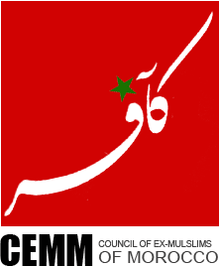Irreligion in Morocco
Irreligion in Morocco is uncommon but is somewhat controversial, studies have shown more than 320,000 Moroccans are convinced atheists. [1] Social pressure is still heavy on atheists and there is little media coverage of non-Muslims in Morocco.
The situation of Moroccan nonbelievers
Moroccan non-believers can express their opinion publicly without the fear of any real consequences , although article 220 of the Moroccan criminal code condemns “those who attempt to shake the faith of a Muslim” to up to 3 years in jail.[2] However, there aren't many examples of this law being used for atheist's in Morocco. Kacem El Ghazzali is one of the publicly known Moroccan atheists. His writings stress the importance of freedom of thought which lacks in Islamic countries.[3][4]
Council of Ex-Muslims of Morocco

In 2013, the Council of Ex-Muslims in Morocco was founded by Imad Iddine Habib.[5] It was the first public atheist and non-religious organisation in a country with Islam as its state religion.[6] The goals of the council are:
- Universal rights and equal citizenship for all. We are opposed to cultural relativism and the tolerance of inhuman beliefs, discrimination and abuse in the name of respecting religion or culture.
- Freedom to criticize religion. Prohibition of restrictions on unconditional freedom of criticism and expression using so-called religious ‘sanctities’.
- Freedom of and from religion.
- Separation of religion from the state and legal and educational system.
- Prohibition of religious customs, rules, ceremonies or activities that are incompatible with or infringe people’s rights and freedoms.
- Abolition of all restrictive and repressive cultural and religious customs which hinder and contradict woman’s independence, free will and equality. Prohibition of segregation of sexes.
- Prohibition of interference by any authority, family members or relatives, or official authorities in the private lives of women and men and their personal, emotional and sexual relationships and sexuality.
- Protection of children from manipulation and abuse by religion and religious institutions.
- Prohibition of any kind of financial, material or moral support by the state or state institutions to religion and religious activities and institutions.
- Prohibition of all forms of religious intimidation and threats.
Notable irreligious Moroccans
In Morocco
- Ahmed Assid, A Moroccan philosopher, active secularist, poet and author.
- Zineb El Rhazoui, co-founder of the Mali movement, and human rights activist.
- Kacem El Ghazzali, a secularist writer, and human rights activist. He is one of the few Moroccans to publicly announce his atheism.
- Ibtissam Lachgar, a feminist and LGBT advocate. Co-founder of the Mali Movement.
- Najat El Hachmi, a Moroccan writer.
Diaspora
- Hassan Bahara, a Moroccan-Dutch writer.
- Hafid Bouazza, a Moroccan-Dutch writer
References
- Publié par Sara El Majhad. "Une étude explore les croyances religieuses dans le monde: Le Maroc, ses 93% de croyants et ses 320.000 athées | Aujourd'hui le Maroc" (in French). Aujourdhui.ma. Retrieved 2016-06-02.
- "Maroc : L'article 220 : Actualité religieuse". Forum-religion.org. Retrieved 2016-06-02.
- "Exiled After Threats: Blogger Wants More Freedoms in Morocco". Spiegel. Retrieved 2013-07-06.
- "Hiding in Casablanca". Al jazeera. Retrieved 2013-07-06.
- Shahesta Shaitly (10 April 2016). "Losing my religion: life after extreme belief". The Guardian. Retrieved 14 September 2017.
- "Council of Ex-Muslims of Morocco: the first public atheist organisation in country with state religion of Islam | Council of Ex-Muslims of Britain". Ex-muslim.org.uk. 2013-03-25. Retrieved 2016-06-02.